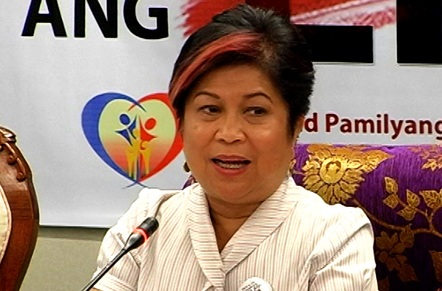
MANILA — The Department of Social Welfare and Development (DSWD) reiterated its answer that no caging among street children was done by the department during Papal visit in the country.
In a press briefing held at the DSWD’s SWADCAP (Social Welfare and Development Center for Asia and the Pacific) training center in Taguig City at 11 a.m., DSWD Secretary Corazon ‘Dinky’ J. Soliman said that some 175 street children would be presented to Pope to further counter and prove that no caging or jailing incidence among street children had ever happened.
Soliman said that a total of 175 street children benefiting from DSWD’s program for street children and families will be joining other children participants that were also being taken care by the DSWD in its other centers.
“These children are not hidden from Pope Francis. In fact they will be presented to Pope Francis. They will be part of the send-off activity on Monday. They will be among the 440 children that will participate in a song and dance presentation in the send-off ceremony for Pope on Monday,” Soliman said.
She said that they suggested to church leaders before that street children be added or be part in the program of activities for Pope and they were thankful that such request was granted.
“We actually requested church leaders since they are the one who were doing the schedule of Pope,” she said.
She also said that some of the children were selected as early as December while the practice begins January of this year.
Among the songs that the children will sing were Tell the World of His Love, Shine Jesus shine and We are God’s children.
She further reiterated that there was no truth on the article that came out that street children were caged to hide them during Papal visit, which was picked up and published by a United Kingdom on-line tabloid.
“We do not jail children. We jail abusers,” she further said.
She described the article as malicious and blatant lie since some of the photos showing children as abused and in jail were not the one that DSWD and its centers were usually doing in taking care of the disadvantage children.
She said that the photo of a malnourished child (Frederico) was taken sometime in October when DSWD rescued him and as of now that child is already in an enhanced condition through the photos she had shown in a presentation.
She further said that she ordered for an investigation of children being detained in Pasay and Paranaque jails and the results revealed that there were no street-children found detained in the mentioned jails and center in article on the same day that they read the article.
She said added that it was possible that photos showing children inside jail, which were included in the article were not street children but teenagers or minors undergoing rehabilitation because they committed some minor crimes like theft, snatching and solvent sniffing or drug-related offense.
She said that they had made formal communication to Ambassador of UK so that the ambassador can officially transmit that to UK because in social media, the article that came out let to some negative bashing.
She also said that as a caring agency that protects the children, the DSWD continues to acknowledge the fact and does not deny that there are challenges that they face among street children which the department continues to look for solutions in the past years and does not resort to jailing innocent children.
She said that part of facing that challenge was continuous reaching-out to children in cooperation with the local government units (LGUs) and non-governmental organizations (NGOs) and not jailing the street children.
She also said that children being rescued were placed in centers were they were provided with services.
The homeless or those who do not have permanent homes or needing special protection because there is an existing problem on their parent’s capacity to rear them were listed as beneficiaries of comprehensive program for street children and families.
That program dubbed as Modified Conditional Cash Transfer (MCCT) provides health and cash grants to them aside from renting an apartment or room for them for a period of six months to one year.
The rental fee is shouldered by DSWD to trained them and let them develop the notion that street is not a safe place for them to live and it is convenient to stay in a permanent home.
During the rental period, the children are ensured that they are going to school through Alternative Learning System (ALS) program of Department of Education (DepEd).
Their parents are being equipped with knowledge and training that they can use in forming a livelihood or for seeking employment.
Part of the period is also linking them to employers so that they can continue paying the apartment and provide decent earning for their family.
She also said that the department was supportive on the message of Pope on the role of family and in making sure that children would have a future with dignity embracing the values of respect, justice and love.
She said that such was being addressed under government’s Conditional Cash Transfer (CCT) which ensures that poor families who did not have the capacity to provide a better future for their children were being assisted.
“Through the MCCT program, we give these vulnerable street children and their families , a fighting chance to shape their future,” the DSWD further said.